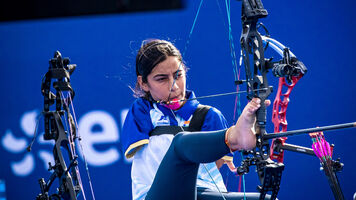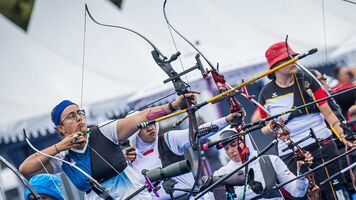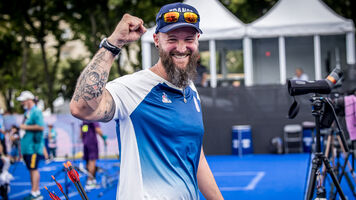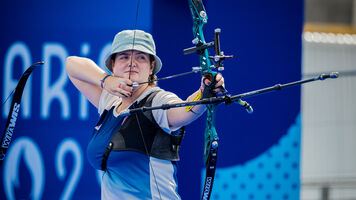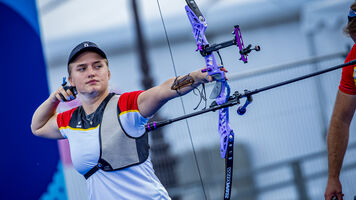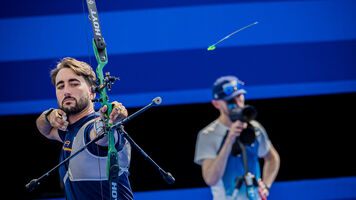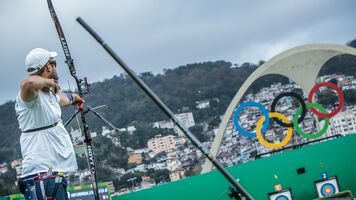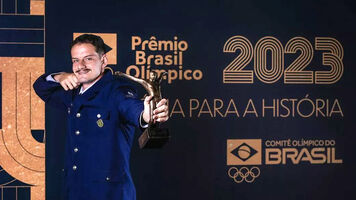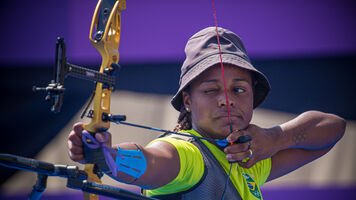Surfing a wave – Horackova reflects on fateful day of worlds win
ATHLETE SPOTLIGHT is presented by WIAWIS.
She wasn’t the archer most expected atop the podium after the last competition arrows in Berlin.
But there, Marie Horackova stood. At midday on Sunday 6 August, she collected her World Archery Champion trophy, an Olympic quota place for the Czech Republic and a watershed major international result for a nation largely under-represented in archery’s historical hall of honours.
“I can’t say winning the worlds didn’t change my life,” she says.
“I became a full-time athlete. No more worrying about how to earn money for a living while still doing archery at a high level.”
A sports teacher, the 25-year-old is now a Czech sports star.
“I’m in the running of all the awards, on the front page of the news. I’m still learning, but I really like all the new stuff happening. And I have the opportunity to be in a community of top athletes and that feels amazing because the people are awesome.”
Horackova’s international results before Berlin? Limited.
She finished third at the final qualifier for the Tokyo 2020 Olympics, winning a ticket to her debut Games, but had otherwise been middle of the pack.
A quarterfinal loss and fifth place at July’s European Games had marked a career-best.

The world championships have a track record of surprise recurve women delivering under the spotlight; see Denisse Van Lamoen (2011), Maja Jager (2013) or Ksenia Perova (2017).
Marie was seeded seventh after qualifying in Berlin then battled through two rounds of matchplay to make the elite eight – and the arena. Up against the latest Korean to break onto the international scene, Lim Sihyeon, in the quarterfinals, another excellent – but off the podium – result looked inevitable.
“I was thinking only about that first match because that was the most important,” says Marie.
“I prepared myself for two days mostly imagining my shots there on the podium. Shooting on the podium is special for me. So much more fun. I love the crowd around.”
Horackova shot three 29s to beat Lim in straight sets and, suddenly, she was in the semifinals.
“It went better than I was expecting,” she admits. “The wave started there and then I was just surfing it.”
Another straight-set win over Noda Satsuki followed, this time a perfect 30 punctuating opening and closing 29-point series, before a third consecutive three-setter to beat Alejandra Valencia in the final.
“I don’t know why,” says Horackova. “I made my ‘bubble’ better.”

“The hardest part of a competition is on the main field, where you start the competition fighting for a good spot in qualification and then in matches to have a chance at the podium,” says Marie.
Her results on the main stage in Berlin might have been a surprise – but they weren’t a fluke.
She scored points at a higher rate, limited mistakes and averaged a higher set score than any of her contenders. On Sunday in Berlin, Marie Horackova beat out seven of the best to the world title.
“Even if the way of getting to the top [is different], each girl is a hunter on the field,” she says.
“What do we have the same? Focus. Love of competing. Never giving up. Want to go to the end. Push ourselves forward and forward, celebrate each success but then keep calm and focused on the future.”
The Czech Republic – then Czechoslovakia – was one of World Archery’s founding members in 1931, and crowned world champions in 1935 and 1938.
Marie is the first in the modern era.
Having become only the second Czech woman (after her late mother) to represent the country at the Olympics when she competed in Tokyo, she had begun to make a name for herself. That now pales in comparison to Horackova’s historic result in Berlin.
“Most people are behaving the same and I appreciate that a lot. Some people are proud to help or talk to me or just hear what I am saying,” she says. “I‘m just so glad for the support and media, because now people here about archery and share in this joy, and appreciate the success we achieved.”



